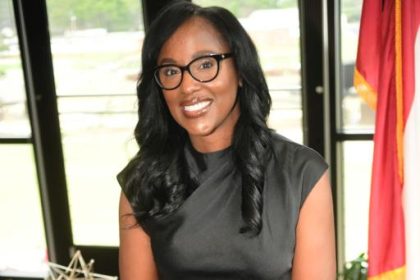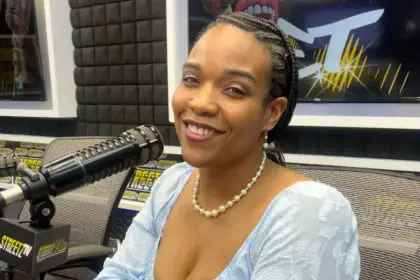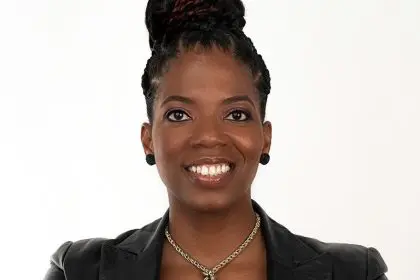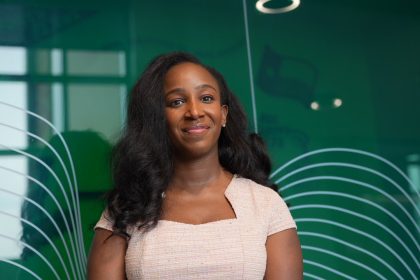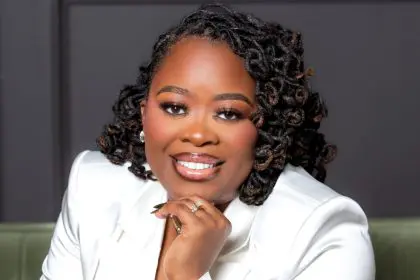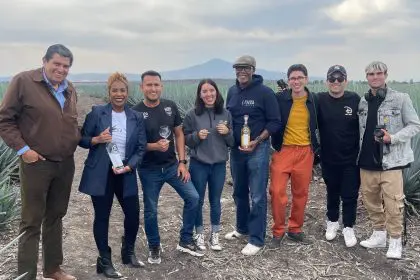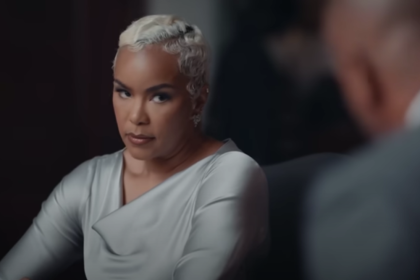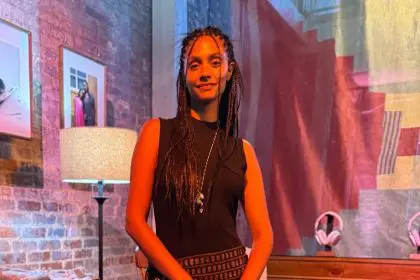
Award-winning director Nataki Garrett has built an extraordinary career breaking barriers and creating pathways for artists. As the recipient of a 2024 Doris Duke Artist Award and President and CEO of Ladder Leadership Inc., Garrett brings a wealth of leadership experience to her role as director of the critically acclaimed opera “The Central Park Five” at Detroit Opera.
Having previously served as Executive Artistic Director of the Oregon Shakespeare Festival and Chair of Theatre Communications Group, Garrett has consistently championed representation and accessibility in traditionally exclusive artistic spaces.
Her remounting of “The Central Park Five” in Detroit continues her mission of bringing powerful Black stories to main stages while creating transformative artistic experiences. The Pulitzer Prize-winning opera by Anthony Davis tells the story of five young men wrongfully convicted and later exonerated of a brutal crime in New York City – a narrative that resonates with contemporary questions of justice, racial bias, and redemption. In this candid conversation with Rolling Out’s Munson Steed, Garrett shares her artistic philosophy and explains why this production is an essential cultural moment for Detroit and beyond.
What do you want our community to know about taking up space in opera?
Black people have been doing opera for a long time in this country. We’re not new to the genre and the genre certainly isn’t new to us. There are some opera divas that we know whose names we know, but the beautiful thing about opera is that it’s a contemporary medium. It’s a good container to tell the story of what’s happening right now.
And although the story takes place in 1989 into 1990 and into the early 2000s, it’s still very relevant right now. It’s a contemporary story being held by a contemporary container.
What are the elements that really make a great opera?
The first thing is Anthony Davis and his mastery at the composition, the music carries so much, and what I love about opera is this sort of music is the storytelling. There’s something about our senses that we understand what music is saying. Our bodies, our spirits, our minds, our hearts understand what music is trying to say to us, even if our intellect doesn’t catch up with it. The music catches you from the very beginning.
I think we’ve been taught in this society that opera is for some sort of highbrow, upper echelon folks who have a certain kind of experience and resource. But actually music doesn’t care about that. The music actually knows you and knows your spirit and knows your access to empathy and is trying to get in there with you. My staging is also just a way to support what the music is already doing. It helps to unpack the story so that you have the visual elements to sort of hold it.
But really, what makes a good opera is, you have to have powerful singers which we do have. You have to have amazing music. You have to have the top level conducting. We do have Maestro doing just one of the most prolific jobs in the opera world by unpacking this amazing music for all of us to hear and I think we also just have to remember that it’s just like everything else. This is for us.
This is a moment for us to actually celebrate, because there’s been a victory in this. Can you talk about the sound, the creativity, the beauty that can be found when you go to experience it? And who should they attend with?
They should bring everybody. Bring the whole family, bring everybody with them. It should be all the generations coming to experience it. This is an expanded opera by a Pulitzer prize winning composer, Anthony Davis, that tells the story of the Central Park five, who were wrongly convicted and incarcerated and then exonerated from the crime. After somebody else admitted to a brutal assault of a white woman who was jogging in Central Park on April 19th, 1989.
The actual story of the five is impressed upon me and it’s a part of my experience. 1989 is the year that I graduated from high school. I remember this story, and I remember the impact of this story and a couple of years later, I do believe we will have Rodney King. This is actually very clearly about a time.
What happened to these boys is extremely tragic, but the outcome through their exoneration, and even recently being given a legal ruling that allows them to continue to pursue an anti-defamation case against Donald Trump, who continues to purport this idea that these five now men who were boys at the time are guilty of a crime that they did not commit, that a whole other human being admitted to. The beauty of this is it’s contemporary. It’s a story about now.
Right now, the President of the United States continues to persecute people in this same way recently, incarcerating without due process a group of people that he sent to a prison in El Salvador.
We’re finding, as the stories start to uncover, that so many of those people are clearly not criminals, but even if they were all criminals, they should have due process, which is the bedrock of our constitution, and so, by taking out an ad in the New York Post, and by continuing to purport this idea that these boys, who are now men are guilty of a crime that they did not commit.
He continues to exacerbate this idea that any one of us at any moment could have this experience. There’s two things – one thing is, the joyful part of this story is that after going through this kind of trauma, some of these boys were thirteen, fourteen years old.
They’re exonerated of the crimes. That means that not only were they released from having committed the crime, but it means that they never did it in the first place, legally they had never done it. By the law they were exonerated. And I think that’s really important that at some point, justice does come back around. It may not meet you at the moment that you think it’s supposed to be there. But, like God, it does come back around.
I think that’s really important. The stories of Kevin Richardson, Antoine McRae, Yusuf Salaam, Raymond Santana Jr., and Corey Wise, live in our history and are a part of our story, and that’s important for all of us to experience. And the last thing I’ll say about this is, I’m so excited to be doing this particular version of it in Detroit.
When I direct, in my own heart and mind, I direct for us. I want us to come see it. I want us to be in the room. I want us to know that the story is for us, even if the room is filled with all kinds of people, and I welcome everybody into the room.
But I want to make sure that our stories are reflected. So often, we go to see anything performed, and we’re witnessing somebody else’s experience. This is an opportunity for the status quo to be flipped for the story to be about our experience, our exoneration, our joy, our ability to move on with our lives. Our redemption.
Share with us about your journey to be a director, to be part of the arts, to shape our culture for us, so that we are heard in spaces that we typically wouldn’t be.
I was raised by a family that said that all of this is for us, my grandmother, my mother. My mother, made sure I went to the opera, my grandmother made sure I went to the symphony. I went to see the ballet, and so it’s for us, because it exists and we perform in it. It’s for us because our taxpayer dollars pay for it. It’s for us, because we are a part of the fabric of this society, and deeply so, we should not feel like we should exclude ourselves from it.
It’s important for us to not only go to see these stories, but to see all the stories, because they all belong to us. And as a culture maker and a theater maker by trade. I’ve always believed that this space of the audience should be occupied by as diverse a crowd as is represented in the microcosm of this country.
Everybody should be in the room and so often I’m brought in to direct pieces that are about the black experience, even more so, we should be in that room. But I think we should begin to demand that these rooms are for us and by us, and about us, and should reflect us.
We should not segregate ourselves from these spaces. Because I’m working with some of the most amazing singers in opera of our time, and they are bringing it. Frederick Ballantyne, Nathan Grainer, Markel Reed, Chaz’men Williams Ali, Justin Hopkins, Amanda Lynn Bottoms.
They are killing the game, and they are working very hard as opera artists, in these spaces that sometimes they only get to come in and tell these stories, if they know that you’re coming, and they know that you’re coming back, you’ll see them in all the pieces, and that’s what we’re trying to get to, is a space where these spaces are for all of us, where our majesty and our magic can shine through.
Talk about your creative process when putting all of this together for us, what you see, what you bring forward, how you allow people to fill up spaces.
My process on an opera is a little bit different. I’m a theater director by trade. It’s a little different than what I do in the theater, because the performers have to hold so much as they’re doing this work. They’re like – where is my sound cue? What note do I come in on? What’s the downbeat? Do I walk and then cross and put this thing down when the note ends. There’s a lot of them for them to hold.
A lot of my work is about creating a container for that work that they’re already doing and allowing the staging to highlight the storytelling that they’re being asked to hold through both music and their full bodies.
My work with this design team and I’ve worked with them before was, how much can we make sure that the machine of the room holds the story so that they can stand under that light and deliver that aria and the pristine quality of their voices can come through.
What I love about operas, it’s not so much how much I can do. It’s more about how much I can get out of their way. What can I do to hold them there, and then give them what they need to be held and supported, and get my hand out of the way, so that the story can continue to be told in this very remarkable way, through the voice and through the music, and through this full orchestration.
This piece is different, when we did it in Portland, and this is a remount of that Portland production that I staged when we did it in Portland. It was for a much smaller orchestra. And now we’re doing it, Detroit Opera has the option of having this very full orchestra.
He reorchestrated it for a fuller orchestra. Even more so it’s how do I create enough that helps to support the story and then get out of their way, so the voice can take hold of the people who are experiencing the story.
If you were at Spelman or Howard and were going to challenge the next set of creative directors, directors of theater, what would you challenge them to do? What would be the three things that you think should be part of their journey?
I’m a Unionite. I’m a panther. I went to Virginia Union University in Richmond, Virginia, HBCU. I will imagine I’m telling a generation of every HBCU student who is looking to pursue a career in the performance realm. Don’t let anybody tell you that your story isn’t important. If it’s important to you. It’s important to all of us. That’s the first thing.
The second thing is, don’t ask for permission. You make the space. You can either move into the spaces that you believe have the resources or create the space, and the resource will come. And the last thing is, remember who you’re telling it for? Who all gets to experience it? Who are you inviting to the table? Who are you inviting into the room to have the experience of the story, and does it reflect the truth of their existence?
That’s what I would say to another generation of makers, and also my job is to create a path, to be a ladder, to get out of your way so that you can actually rise above where I am. Everything I do is about creating the rungs on that ladder so that you can climb beyond me.
You’re in Detroit. What should they know that this is special? What should they know about black excellence getting ready to happen for this Central Park five that will be transformative for everybody who chooses to be in that audience?
I will say this, that the room is going to be excellent, whether they show up or not. You understand what I mean – that room is solid. I’m working with some of the most talented artists in the world right now on this opera. It’s even more excellent if the audience shows up in the way that it needs to, it’s so important for the Detroit audience to be here. Otherwise I don’t know why Detroit Opera would do it. You do it because you know that the audience is here, and this is an invitation, as should all the operas that happen at Detroit Opera. But this in particular, this story is for us.
As long as we are here in this town we should show up to places like this. So, I’m looking for, what do they call it? The Big nine. I want all the Greeks to come out. I want every church. The royal night. I want all of us to come, if we can show up, for I want the Winans family from Detroit to be here.
Everybody from Motown should be here, and that’s also because again, on this stage, you have some powerful musicians who are holding this story, and if you are of that ilk, if you are in the performing realm, or you enjoy the performing realm that you will know that this room was meant for you.
Describe two of your superpowers
Two of my own superpowers. I believe that you lead from the center. You pull those forward who are behind you and that the job is to create a path for somebody to come up through.
That’s how I work as an artist, that’s how I am as a leader, and that’s how I am. That’s what I coach now. What I do now, as a coach is teach people that we’re here, not just for us. Right now. We’re here for another generation, even more so, right now in this moment in history than probably ten, fifteen years ago.
My superpowers is that I know how to make a path. I know how to crawl up a path, climb a path, clear a path. I know that it’s about creating a path.

